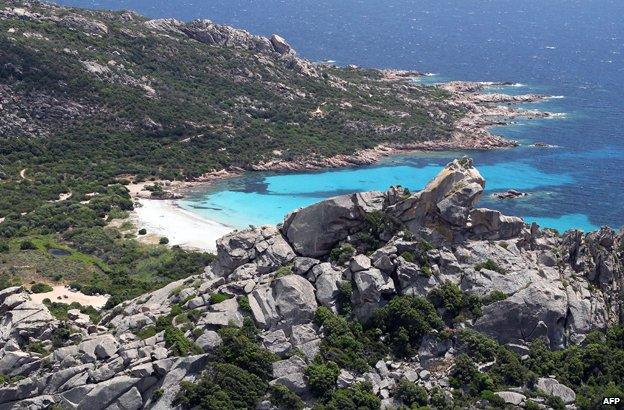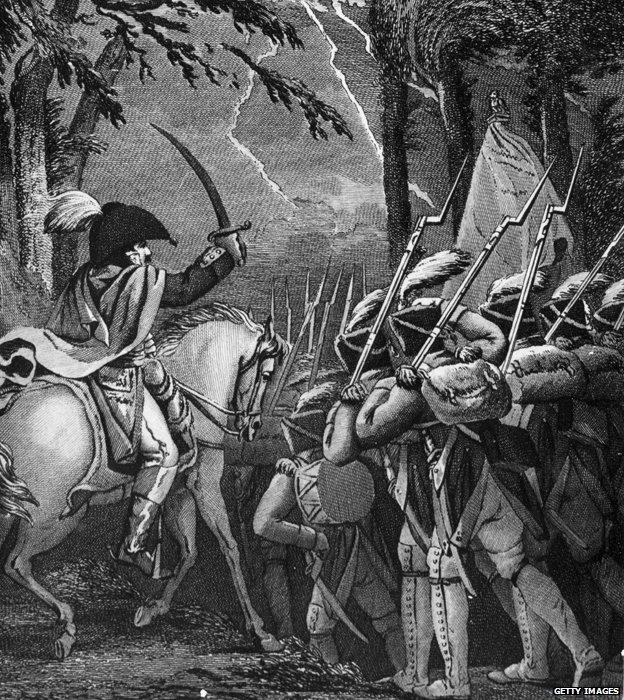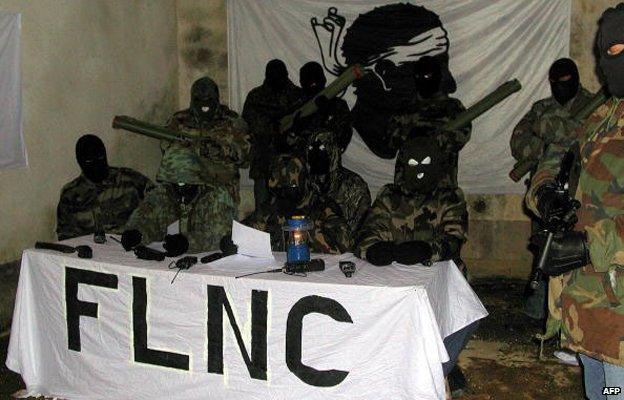Are Corsica's militants and mafia a thing of the past?
- Published

Located off the Italian coast, but politically part of France, Corsica has experienced a violent independence struggle since the 1970s. But in June armed militants announced they had laid down their weapons. So has peace really broken out?
As I drove around Corsica on the first of two visits this year, I was struck once again by the island's violent beauty.
Against a backdrop of jagged granite mountains, the maquis had erupted into brilliant yellows and purples.
The beaches I glimpsed from the twisting roads showed white sand alongside turquoise water. The survival of the Corsican landscape, compared with the desecration of so much of the Mediterranean, seems miraculous.
But as several Corsicans recently reminded me, it's the independence movement's willingness to blow up seashore developments that's protected the so-called Ile de Beaute - the Isle of Beauty.
It's important to add that no tourist has ever been harmed. For a mountainous terrain where agriculture is a tough challenge, tourism is a blessing, the golden goose no-one would dream of killing.
But outside the summer months, when the island's population doubles with holidaymakers, an armed struggle has raged for more than 40 years.
Corsicans have always had a reputation for toughness and vendetta. James Bond fell in love with, and married, the daughter of a Corsican brigand. According to the newspaper l'Express, Corsica's more violent than its near-neighbour Sicily.
In the last three years alone there have been 40 murders, mostly mafia-related - grand banditry, as it's rather picturesquely known.
Killings take place with clinical efficiency, but the motives are opaque. There's often speculation about land deals, murders designed to, in a sinister phrase, "send a message", and tit-for-tat killings.
But experts on organised crime admit the threads of violence in Corsica are impossibly tangled. What is certain is that almost none of the murderers are ever apprehended.

French troops marching in Corsica, 18th Century
Corsica became a French colony in 1768. It had one of Europe's earliest functioning democracies, but France brutally abolished that, shut down the university, and banned the indigenous language.
Over the next two centuries the island was rendered into a region of France. But resentment smouldered on. In the 1970s, after Vietnam and revolutions worldwide, armed revolt broke out against Corsica's perceived colonial ruler.
The fighters made their mark and wore down the French state with a kind of attrition similar to the IRA in Northern Ireland. But by the 1990s various independence factions were turning against each other and political goals were getting foggy. French security forces had ever more efficient electronic surveillance and public support for armed struggle was declining.
Few younger islanders are gripped by the nationalist fervour that animated their fathers' generation.
I spoke to a man in his late thirties who has a young family and is building a successful business. He felt uneasily that he should sympathise with the older generation's long struggle.
"But what did they achieve?" he asked. Undeveloped beaches, yes. And some say they held back drug trafficking on the island.
But they didn't achieve independence. And ironically, the ballot box could now be key to Corsica's future.
Recent elections, like the mayoralty of the important city of Bastia, have seen independence candidates gaining power. Why fight a traumatic clandestine war if you can get what you want by legitimate means?
So not everyone was surprised when, in June, the movement called FLNC, or National Front for the Liberation of Corsica, unexpectedly announced it was downing arms.

FLNC members brandishing weapons in 2004
Few islanders I met still dream of a genuinely independent Corsica - indeed, many believe that transnational institutions like the European Union make nationhood increasingly irrelevant.
The Scottish referendum excited much interest and admiration for British political pragmatism. But all that many Corsicans now hope for is increased autonomy, more control over their language, and a halt to the land speculation that's pushing property values beyond the reach of ordinary islanders.
Many also want a halt to immigration, and if that sounds like a UKIP agenda, then - yes: supporters of independence are as likely today to be on the right as the left.
What the FLNC called for when it declared its ceasefire was a response from the French state. But so far, there are few signs of movement from Francois Hollande's socialist government.
In Northern Ireland arms were eventually put out of commission, destroyed in a process overseen by a neutral Canadian general.
When I mentioned this to an elderly independence supporter, he laughed out loud. "We might lay down our arms but Corsicans will never abandon their weapons," he told me.
And if Paris doesn't budge, he warned, then Corsican frustration will lead to more violence, worse than ever before.
Many former independence leaders disagree. They feel Corsica is moving inevitably towards a new, non-violent phase.
But the Island of Beauty is also an island of passionate emotions. And its militants' weapons are very far from being out of commission.
How to listen to From Our Own Correspondent, external:
BBC Radio 4: Saturdays at 11:30
Listen online or download the podcast.
BBC World Service: Short editions Monday-Friday - see World Service programme schedule.
Subscribe to the BBC News Magazine's email newsletter to get articles sent to your inbox.